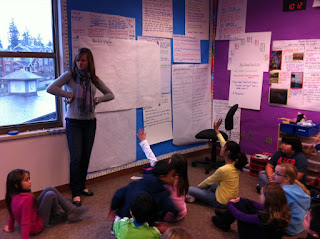Dear Families,
It was great meeting with so many of you to talk about your child's progress during parent conferences last week. Thank you for all that you do to support your child's learning at home!
Here's what we've been up to, even before our snow days:
Math
- Finished Unit 4, focused on decimals
- Took test on Friday
- We'll take the Open Response separately sometime mid-next week
- Parent letter for Unit 5 available here. These are a great resource!
- Starting Unit 5 Monday--Big numbers, estimation & computation
Reading
- We've been building our stamina again with read to self and read to someone
- Ask your student about building stamina and these two Daily 5 choices
- When does it make sense to back up and reread?
- How can readers activate their prior knowledge? Why would that be important to do as a reader?
- Started a new read aloud Where the Red Fern Grows, one of my all time favorites
- How has Billy Coleman shown great determination so far?
Writing
- Discussed story arcs, the pattern most narratives follow in some way where life starts out good, then there's some sort of problem or tension that builds. There's a climax or turning point, followed by a resolution and a sense that life is good again.
- Students made their own for their seed story
- It was powerful because they could quickly re-envision their story in a different way
- This has been helpful as a revision tool for their seed stories
- Revisited elements of powerful endings and that they should relate back to heart of the story
- Students are now in the process of revising, editing, and publishing this second round of personal narratives
Science
- Examined and classified pictures of erosion
- Focused on one picture within table groups--made an observation, asked a question about it and made a prediction about the question
- Learned about underground erosion and caves
- Did a water cycle reader's theatre where each student had a script and part.
- Ask what part your child played. What did they learn?
- Learned about the water cycle with a guest teacher--Miss Cowgill
- Built an actual water cycle model--ask your student about this
- Did two hands on investigations
- Of humus, clay, sand, rocky soil--which had the biggest organic and which had the biggest inorganic particles?
- After shaking up these four soils in a graduated cylinder--which was heaviest (settled on the bottom)? What was the order they settled? (Gravel, sand, clay, humus floating on top)
Art Docent










